Guide to 11+ verbal reasoning

Verbal reasoning is a key part of many school entrance exams, including the grammar school 11 plus. It's not a subject taught on the national curriculum, so many children are unfamiliar with these types of questions.
Key takeaways:
- Verbal reasoning tests your child's ability to solve problems with written information.
- Many grammar school 11 plus exams include verbal reasoning questions.
- Verbal reasoning questions involve using vocabulary and logic, finding or building words, and solving codes and sequences.
- Bitesize learning and reading are great ways to build verbal reasoning skills.
What is verbal reasoning?
Verbal reasoning tests your child’s ability to reason and solve problems with written information. Some of the skills involved in verbal reasoning include:
- Reading fluency
- Reading comprehension
- Vocabulary knowledge
- Phonological awareness
- Logic and problem-solving
- Ability to discover and apply rules
- Attention to detail
Don’t be fooled by the word ‘verbal’. Verbal reasoning can also involve solving problems with letters and numbers! However, for most questions, your child will need to show they understand the meanings of words and relationships between them. Having a wide vocabulary is useful for understanding these questions.
The types of questions used depend on the exam provider.
Which 11 plus exams test verbal reasoning?
Many selective schools include verbal reasoning tests as part of their entrance exams.
CAT4
The CAT4 is an online cognitive abilities test. It's used by some independent schools as an entrance exam, and many secondary schools as a streaming test.
The CAT4 exam includes verbal reasoning questions in 'verbal classification' and 'verbal analogies' sections.
Cambridge Select Insight
Cambridge Select Insight is an online entrance exam used by some independent schools. Cambridge Select Insight used to be known as CEM Select.
This exam includes verbal reasoning questions. These could be shuffled sentences, solving anagrams, and completing missing words.
GL Assessment
GL Assessment is the main provider of 11+ exams for grammar schools. GL Assessment 11+ exams are taken on paper and are multiple-choice.
It's up to schools or consortiums (groups of schools) to choose which subjects to assess. However, verbal reasoning is a common choice. We've outlined many of the types of verbal reasoning questions used in this exam below.
ISEB Common Pre-Test
The ISEB Common Pre-Test is an online adaptive test used by some UK independent schools. This includes a 25 minute verbal reasoning section.
Quest Admissions
Many independent schools use entrance exams provided by Quest Admissions. This is an online adaptive test which can be made bespoke for the school.
Common types of verbal reasoning question
Vocabulary
- Synonyms: identifying words that mean the same thing as each other
- Antonyms: identifying words that mean the exact opposite of each other
- Homonyms: identifying words that have the same spelling or pronunciation, but different meanings
- Odd ones out: identifying which word(s) do not share the same connection as others in a group
- Spot the connection: working out the connection between two words, and applying the same connection to another pair of words
Finding words
- Jumbled words: rearranging groups of mixed up letters to create correctly spelled words
- Jumbled sentences: re-ordering words in a sentence so that it makes sense
Building words
- Joining words: choosing two words which can be joined together to create a new word
- Morphing words: changing one letter at a time from two words to create a new word
- Transferring letters: adding one letter to one word to create a new word
- Missing letters: finding the letter or string of letters that are missing from one or two words
Codes and sequences
- Codes: solving codes using letters, numbers and/or symbols
- Sequences: completing sequences using letters, numbers and/or symbols
Logic
- Statement logic: finding an answer option that is definitely true based on given information
- Deductions: using information in a set of statements to work out the correct answer
- Number/letter logic: working out which number or letter is being described in a statement
Verbal reasoning example questions
Here are examples of some common verbal reasoning question types – and top tips for how to tackle them!
Scrambled words
In 'scrambled/jumbled word' questions, your child will need to work out which option is the word once unscrambled.

Top tip:
Use the clue (which is a synonym of the unscrambled word). Note any letters in the options that do not match the letters in the scrambled word.
Option E can be eliminated as there is no 'i' in the scrambled word.
Synonyms
Your child will need to select two words from the options provided that are closest in meaning. One will come from the group before the line, and one from the group after the line.

Top tip:
Work through each of the options in the first group, matching them up with the second group. Does 'greedy' match with 'stubborn', 'obtuse' or 'jealous'?
If not, go on to 'obstinate' and follow the same process.
Join the words
A new word can be formed from one word in each bracket set. You will need to select two options from the list that, when put together, create a new word.

Top tip:
Use the same logic as the previous example. Take 'bare': are 'barering', 'baretrust' or 'baremate' words?
Move on to the second word, 'stale', and use the same process.
Statement logic
Your child will see a short passage of text and will need to choose the correct statement based on their understanding of the text.
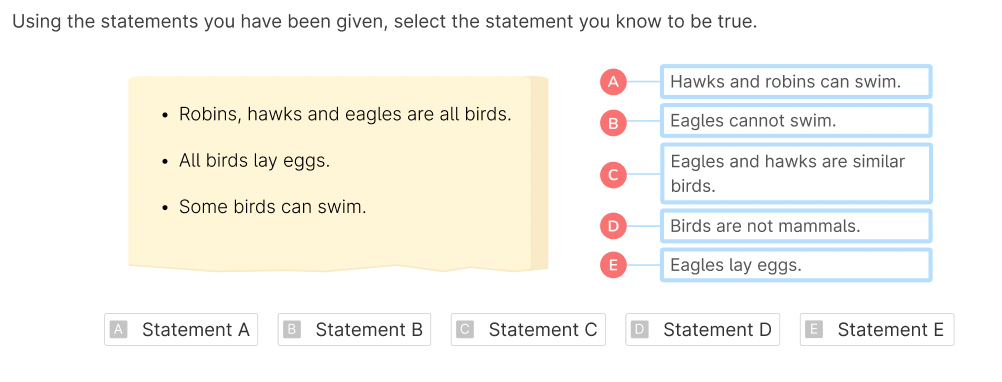
Top tip:
Work through each statement one at a time. Look at statement A: does the text explicitly say that hawks and robins can swim?
If there's nothing in the text to say this is the case, mark this as incorrect and move on to the next statement.
Note that there is only one correct answer.
Solve the code
In these questions, letters, numbers or symbols represent a code that needs to be solved.
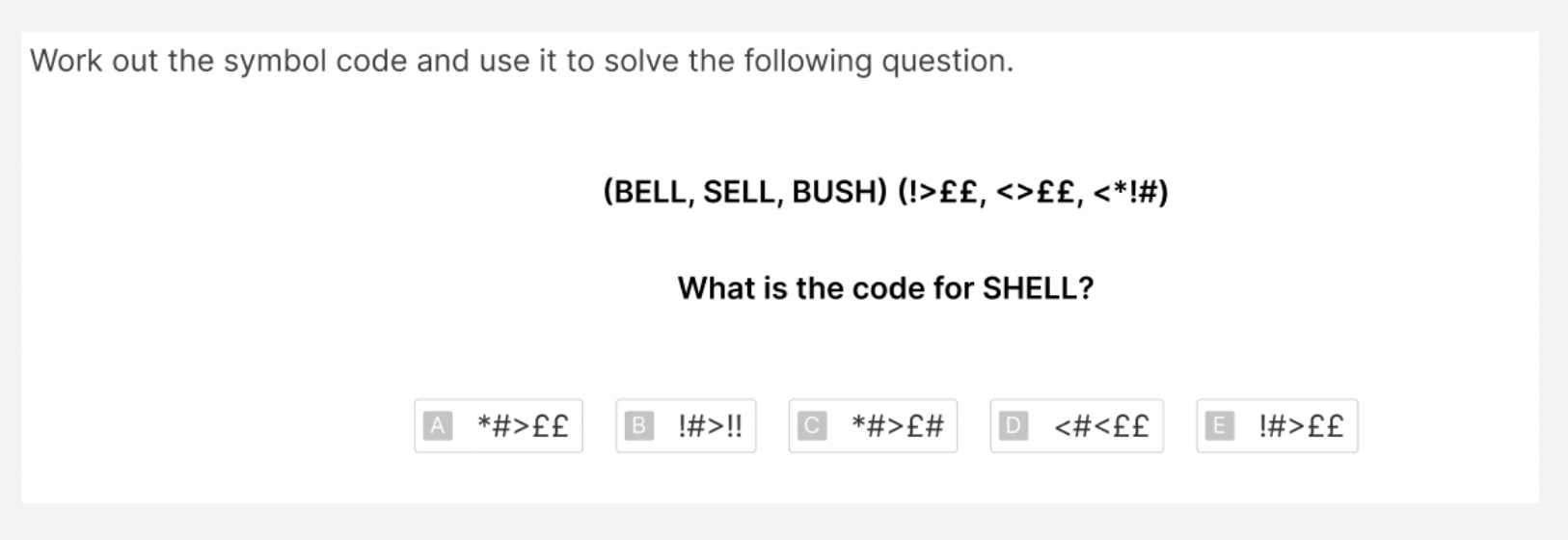
Top tip:
On spare paper (or in the space around the question), solve each letter at a time. Take BELL as an example – the code for this is !>££. Therefore, we know that:
B = !
E = >
L = £
Get your child to solve each letter, which will help them to form the code for the new word.
Is your child ready for the 11+?
See where they stand in minutes. Atom’s free 11+ baseline tests give you an instant breakdown of their strengths and gaps. Know exactly what to focus on next and start preparing with direction, not uncertainty.
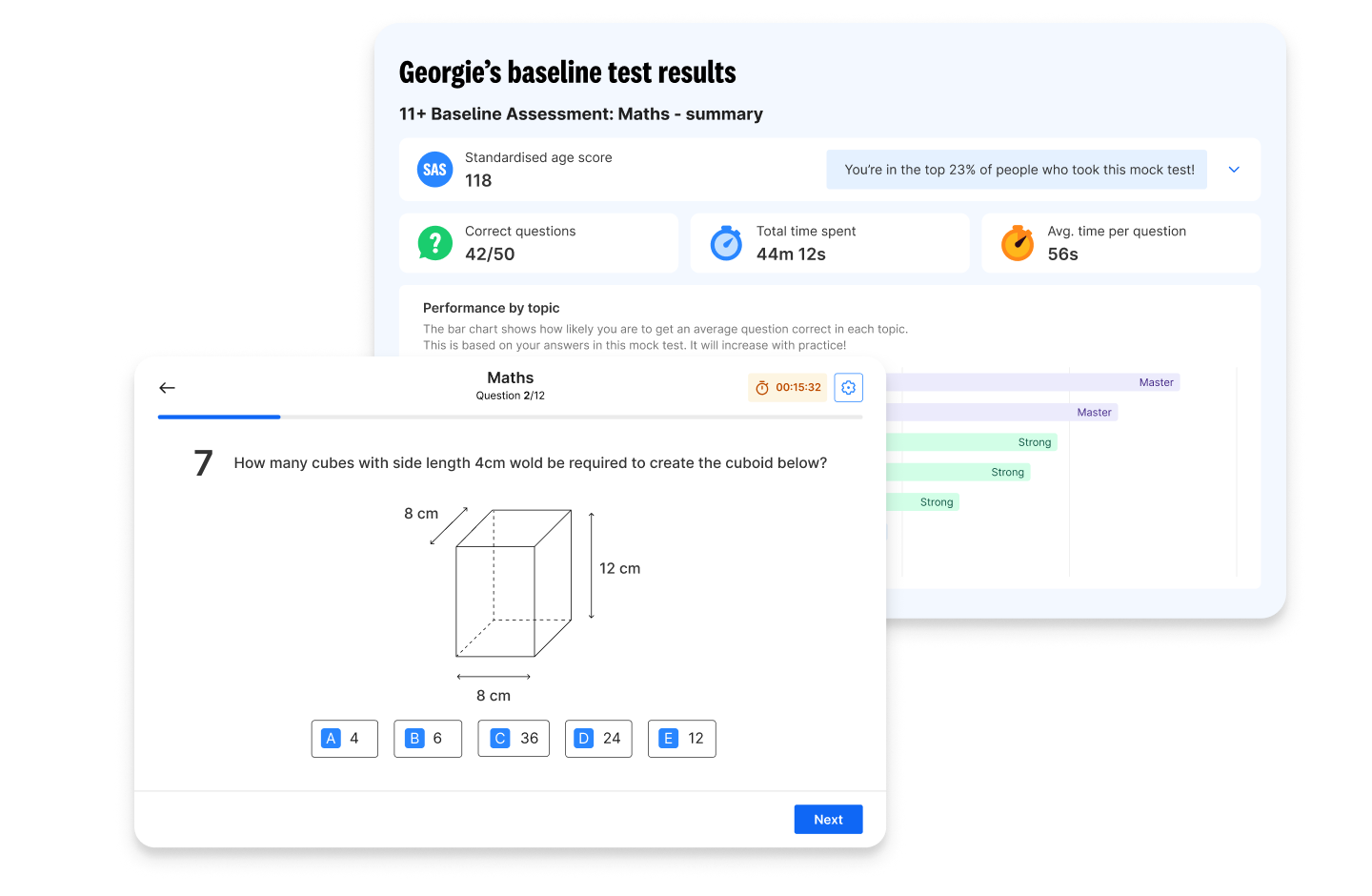
How to prepare for 11 plus verbal reasoning
Verbal reasoning can be tricky. Children attending primary schools aren't taught how to answer these types of questions. However, getting started early and building your child's familiarity with verbal reasoning can help!
Bitesize learning
It’s important to build a good knowledge base before the exam. Using a ‘little and often’ approach when learning is key – our brains encode new information more effectively when dealing with smaller ‘chunks’ of information. For children aged 10–11, child psychologists recommend regular study sessions of 20–30 minutes.
Atom Home makes learning reasoning a more enjoyable process for your child. They'll explore exciting worlds full of interactive questions, earning coins to spend in the Atom shop. Atom adapts to your child, showing them questions at just the right level of difficulty to keep them motivated.
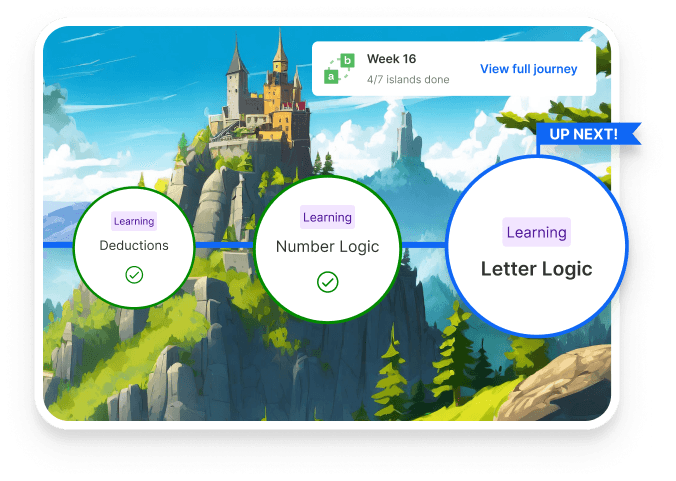
Read for fun
Reading widely and regularly is the best way to boost verbal reasoning skills. It increases the speed at which your child recognises words. This can help them manage their time more effectively in the exam.
Encourage your child to read across genres and a diverse range of authors to help widen their vocabulary and sharpen their analytical thinking. Classic novels are a great place to start, as they are likely to contain a lot of unfamiliar vocabulary. It takes plenty of time to embed new vocabulary into long-term memory.
Play games and puzzles
Reasoning questions require your child to spot patterns and solve problems using logic. Puzzles such as crosswords and sudoku can help your child develop their attention to detail, sustained thinking and visualisation.
Many board games have great educational value, so why not hold a regular family game night? Here are our favourite board games that will support your child's verbal reasoning skills.
Develop exam skills
Once your child feels confident with verbal reasoning questions, they’ll be ready to put their knowledge to the test. 11 plus practice tests will help your child build confidence working under exam conditions. They’re also a great way to consolidate learning and highlight any knowledge gaps that need further study.1
Take control of your child’s 11+ preparation.
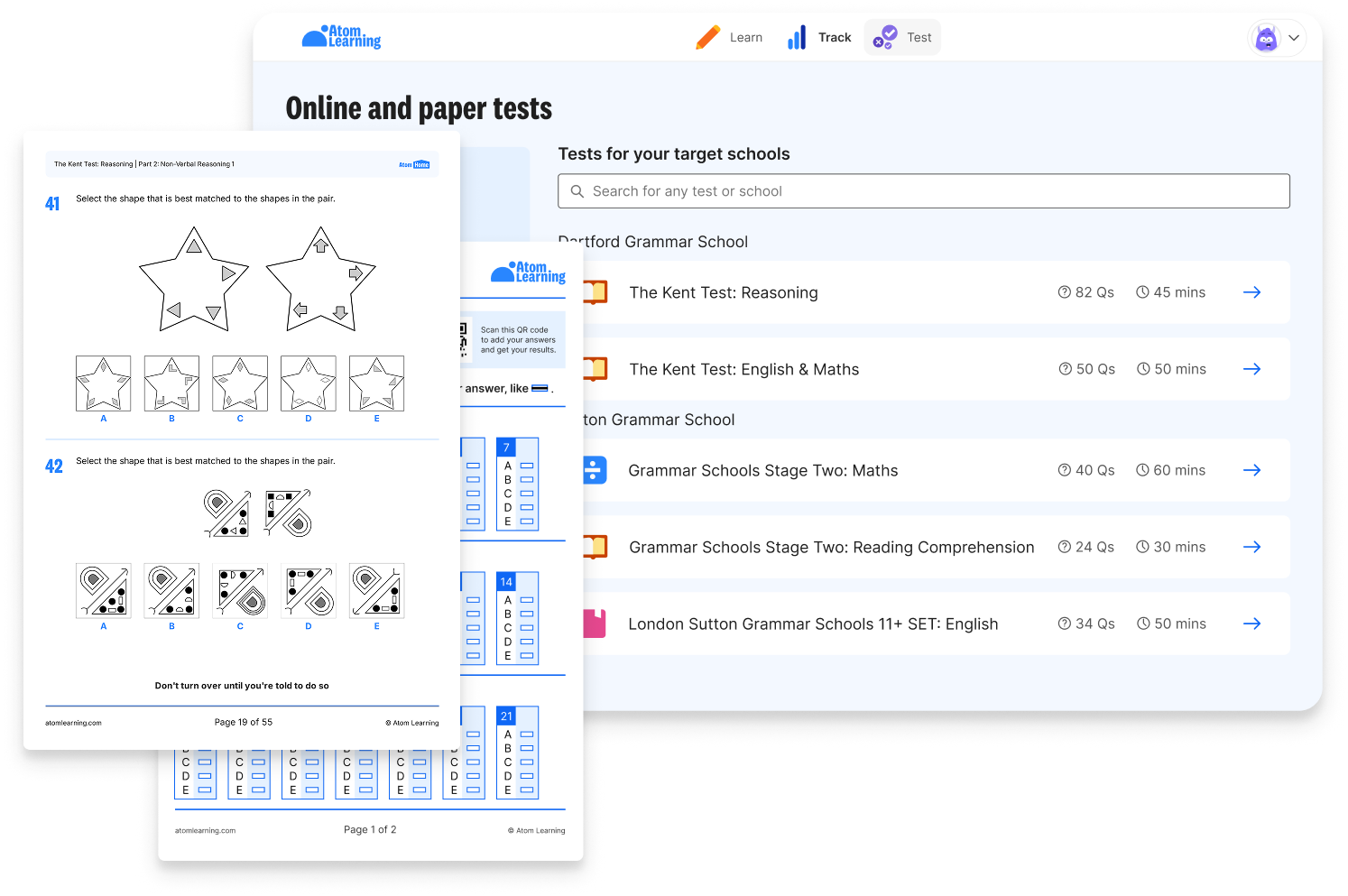
Not sure if your child is on track for the grammar school 11+? You don’t need to guess what to cover or whether they’re ready. Atom shows you exactly what to practise each week and how they’re performing, so you can stay ahead of the process without the stress.
- Follow personalised weekly exam plans that show them what to learn next.
- Download replica 11+ practice papers and upload a photo for instant, stress-free marking.
- Track progress and see how they compare to others applying to the same schools.
Start your free trial and help your child feel fully prepared for the 11+.
